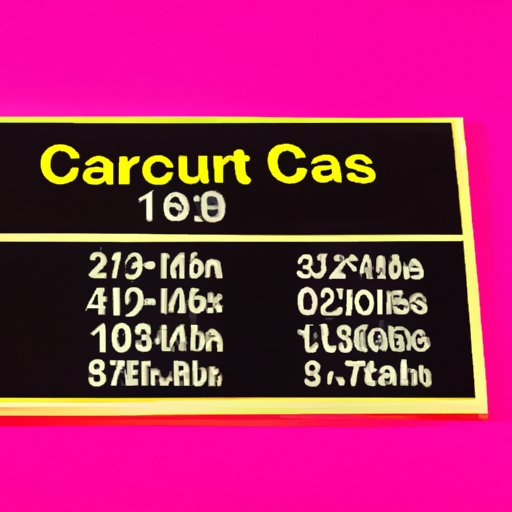Introduction
Calories are a unit of energy that is required by our bodies to function properly. Knowing how much calories you should eat a day is important in order to maintain good physical and mental health. In this article, we will explore the various aspects of calorie intake, including average calorie intake for optimal health, recommended daily calorie intake based on age and lifestyle, the benefits of eating the right amount of calories, and strategies to help reach your goals.
How Many Calories Should You Eat Per Day?
The number of calories you should eat per day depends on several factors, including your age, sex, weight, and activity level. The average adult needs 2,000 to 2,400 calories a day for optimal health. However, if you are trying to lose weight or gain muscle, you may need to adjust your calorie intake accordingly.
Recommended daily calorie intake can vary depending on age and lifestyle. Generally speaking, men aged 19-30 years old require 2,400-3,000 calories per day; women aged 19-30 years old require 1,800-2,400 calories per day; men aged 31-50 years old require 2,200-2,800 calories per day; women aged 31-50 years old require 1,600-2,200 calories per day; men aged 51+ years old require 2,000-2,400 calories per day; and women aged 51+ years old require 1,400-1,800 calories per day.
It is also important to consider activity level when determining how many calories you should eat a day. If you lead an active lifestyle and participate in regular physical activity, you may need more calories than someone who is less active. Conversely, if you do not engage in physical activity, you may need fewer calories overall.
Benefits of Eating the Right Amount of Calories
Eating the right amount of calories is key to maintaining good physical and mental health. Eating the right amount of calories can provide numerous benefits, such as:
- Improved physical and mental health
- Reduced risk of chronic diseases
- Optimal energy levels
By eating the right amount of calories, you can ensure that you are getting all the essential nutrients your body needs to stay healthy and energized. Additionally, you can reduce your risk of developing chronic diseases, such as heart disease and diabetes.
What are the Risks of Eating Too Few or Too Many Calories?
Eating too few or too many calories can have serious health consequences. Eating too few calories can lead to malnutrition, fatigue, and a weakened immune system. Conversely, eating too many calories can lead to obesity, which increases the risk of chronic diseases, such as heart disease and diabetes.

Strategies to Help You Reach Your Calorie Goals
In order to achieve your calorie goals, there are several strategies you can employ. These include:
- Meal planning and portion control
- Keeping a food journal
- Finding healthy alternatives to favorite foods
- Incorporating physical activity into daily routine
Meal planning and portion control can help you stay within your recommended calorie range. Keeping a food journal can also be helpful in tracking your daily calorie intake. Additionally, finding healthy alternatives to favorite foods can help you reduce your calorie intake without sacrificing flavor. Finally, incorporating physical activity into your daily routine can help you burn more calories, making it easier to reach your goals.
Conclusion
Understanding how many calories you should eat a day is key to maintaining good physical and mental health. The recommended daily calorie intake varies depending on age, sex, weight, and activity level. Eating the right amount of calories can provide numerous benefits, such as improved physical and mental health, reduced risk of chronic diseases, and optimal energy levels. On the other hand, eating too few or too many calories can have serious health consequences. To help reach your calorie goals, meal planning and portion control, keeping a food journal, finding healthy alternatives to favorite foods, and incorporating physical activity into your daily routine are all effective strategies.
(Note: Is this article not meeting your expectations? Do you have knowledge or insights to share? Unlock new opportunities and expand your reach by joining our authors team. Click Registration to join us and share your expertise with our readers.)
